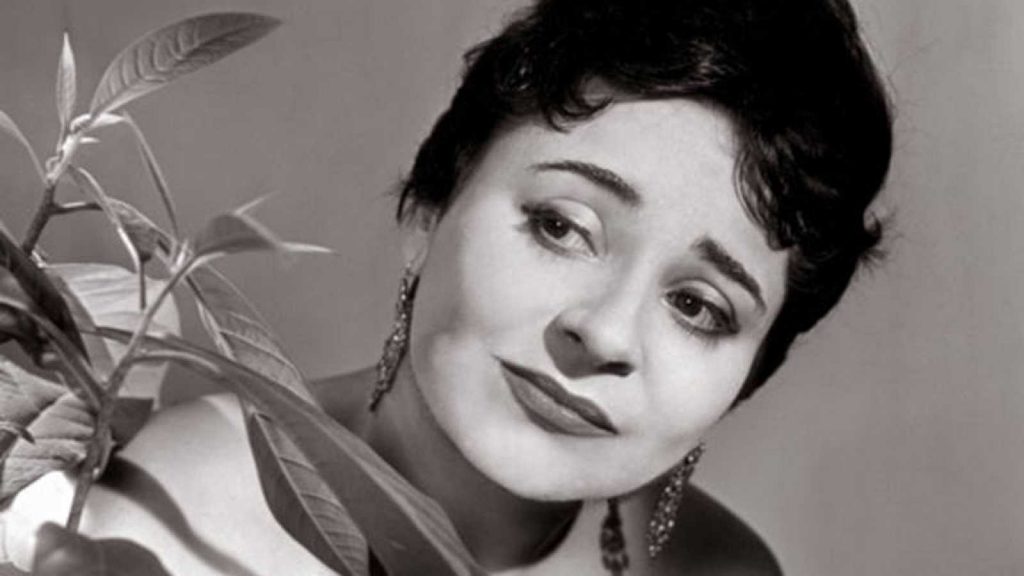Victoria De Los Ángeles
Unforgettable Victoria de los Ángeles: On the Brink of Her Centennial
Top Classical, May 2023
November of this year marks the commemoration of a century since the birth of a true legend of lyricism, the Spanish soprano, Victoria de los Ángeles. In 1923, a singer who was an intimate friend of the first and whom the latter, not particularly given to flattery, defined as “the only flower in the Metropolitan Opera’s manure.” This, of course, refers to the Barcelona-born soprano, Victoria de los Ángeles.
Born on November 1, 1923, Victoria de los Ángeles’ father, Bernardo López, of Andalusian origin, served as the janitor at the University of Barcelona, where the family resided. Her mother, Victoria García, and her three siblings, Carmen, Victoria de los Ángeles, and José, completed the family.
The empty classrooms of the University and the Paraninfo hall, where she could play the piano, were the everyday environment of the singer’s childhood and youth. During her adolescence, Victoria de los Ángeles cultivated her artistic temperament in a self-taught manner.
After the Spanish Civil War, she enrolled at the Conservatori del Liceu, where she was first heard by the singer and teacher Mercè Plantada. There, she pursued her musical studies under the guidance of mezzo-soprano Dolors Frau and guitarist Gracià Tarragó.
On May 19, 1944, she made her solo debut at the Palau de la Música Catalana in a concert in two parts: the first accompanied by the Quartet Ibèric and the second by Pere Vallribera. Shortly after, on January 13, 1945, she made her official debut at the Gran Teatre del Liceu as the Countess in “Le nozze di Figaro.”
In 1947, already known in her country, she won the first prize at the prestigious Geneva Competition, a turning point in her international career. In 1949, she made her debut at La Scala in Milan, first with a recital and, a year later, with Strauss’s “Ariadne auf Naxos.”

Throughout her incredibly successful career, she portrayed the lead roles in more than thirty-five operas, including remarkable performances in “La Traviata,” “Carmen,” “Pelléas et Mélisande,” “Fidelio,” “Faust,” “Pagliacci,” “Werther,” “Orfeo,” “Cavalleria rusticana,” “La Bohème,” “Madame Butterfly,” “Il barbiere di Siviglia,” “Otello,” “Tannhäuser,” “Lohengrin,” “Ariadne auf Naxos,” “Der Freischütz,” and “Don Giovanni.” Many of these performances have been immortalized in her numerous recordings, which are still considered undeniable references today.
During her recitals all over the world, many of which are considered anthological, she made significant contributions to the dissemination of Spanish and Latin American music. She collaborated with her admired Pau Casals and the most prominent composers of her time, including Joaquín Rodrigo, Frederic Mompou, Xavier Montsalvage, Oscar Esplà, Héitor Villa-Lobos, and Eduard Toldrà. She was also accompanied by great pianists such as Geoffrey Parsons, Alicia de Larrocha, Gonzalo Soriano or Miguel Zanetti.
The timbre, a lyric soprano of certain breadth, was luminous, though with very exciting chiaroscuros. It was creamy and caressing, smooth, with evident sensuality, homogeneous, with easy blending of registers, and of the purest enamel. Few singers have enjoyed such a luscious voice with such delicate inflections. Her singing, due to this natural emission, was overwhelmingly spontaneous. Victoria sang as she spoke, without apparent effort; it was a reflex act, like breathing. This led one to think of a surprising technique, undoubtedly stemming from her innate talent, and further developed, completed, and improved by the good work of her teacher at the Conservatori del Liceu in Barcelona, Dolores Frau.
Reflecting on her career, she once said, “So don’t think in reality I am a singer, I think I am a human being that has sung always all her life, and has learned a little to sing, and has found herself in the middle of a career.”
Due to her extended stays in the United States and her love for everything modern and innovative, the soprano became an amateur filmmaker. She captured moments on camera while traveling and, upon returning to Barcelona, documented her family environment through her lens, preferring to observe rather than be observed due to her notable shyness off-stage.
Her numerous recordings are considered indisputable references in the world of classical music.
Her illustrious career lasted until December 28, 1997, the date of her final public concert at the Teatro Nacional de Catalunya in Barcelona, accompanied by Albert Guinovart.
Victoria de los Ángeles passed away in Barcelona on January 15, 2005. As we approach the centenary of her birth, her exceptional artistry and contributions to the world of opera continue to be cherished and celebrated by music lovers worldwide.
